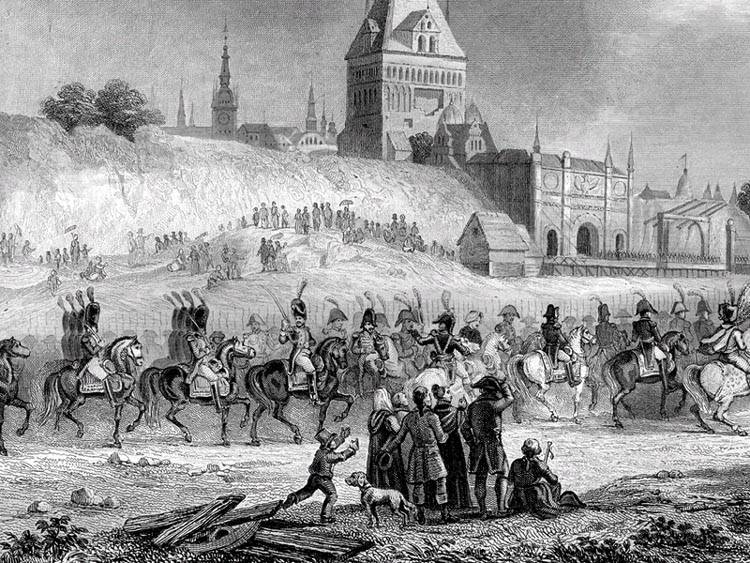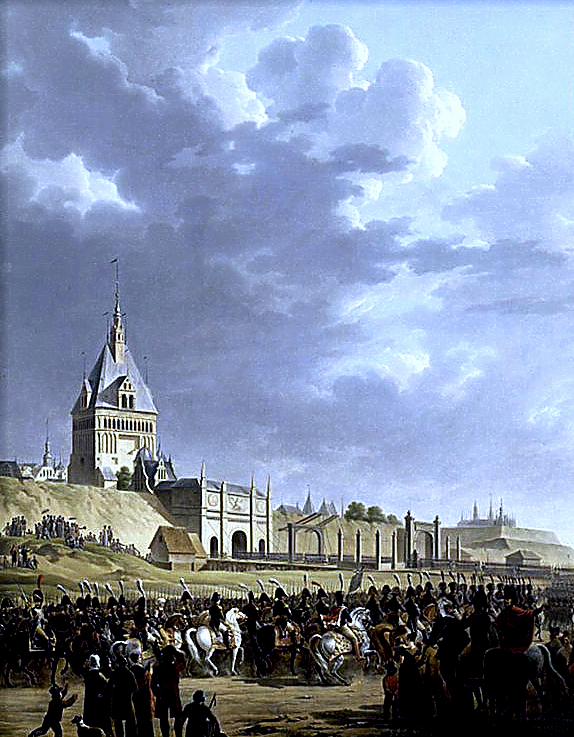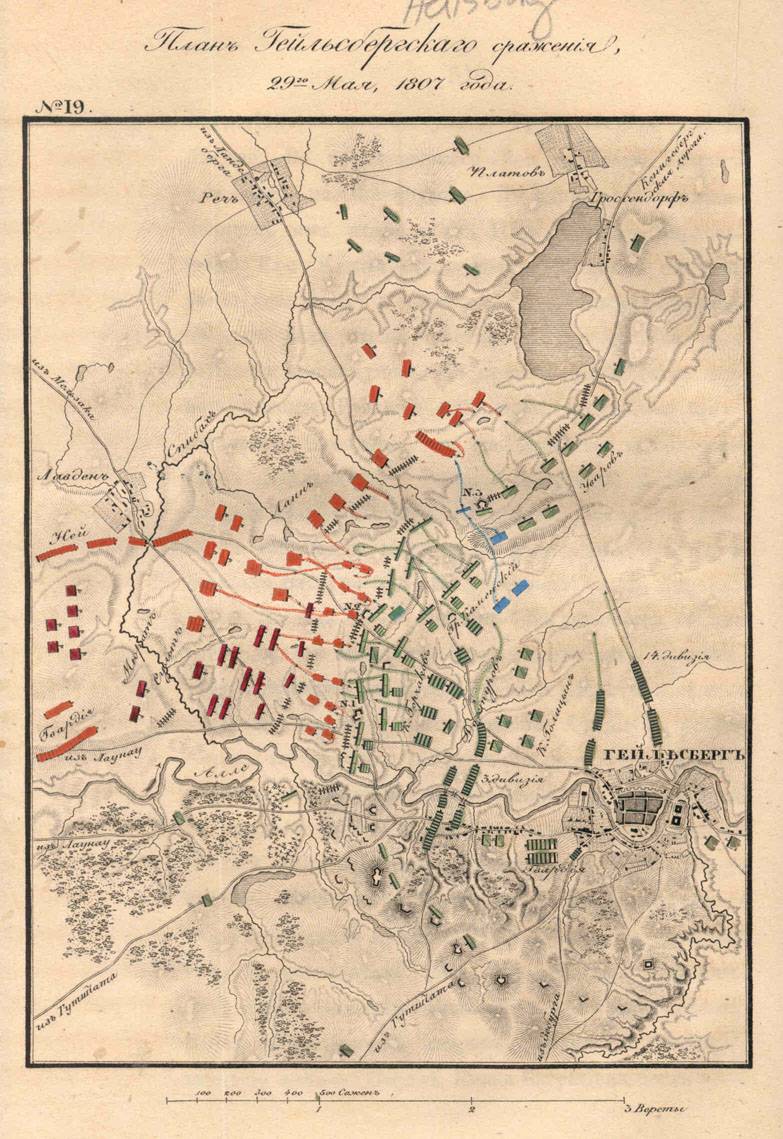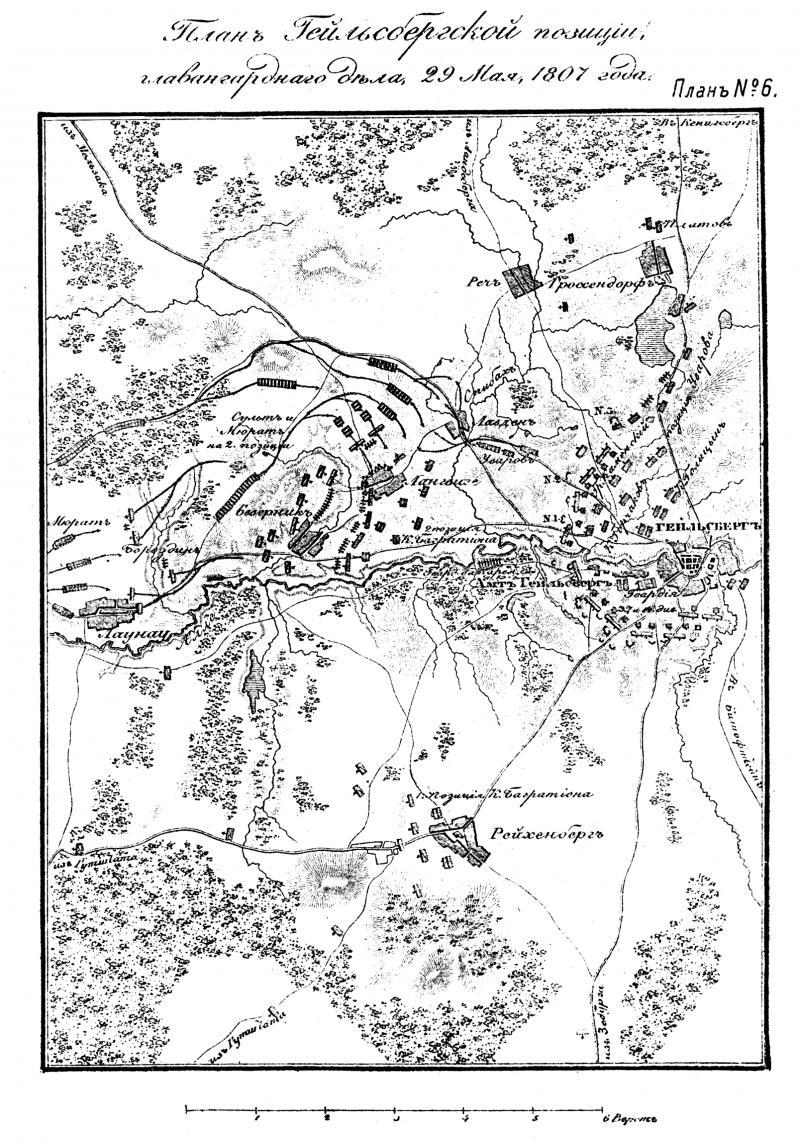1807 campaign of the year: the battles of Guttstadt and Heilsberg

210 years ago, in June 1807, the Battle of Friedlands took place - the last decisive battle of the Russian-Prussian-French War 1806-1807. The French army under the command of Napoleon defeated up over the Russian army under the command of General Bennigsen.
The Russian army was defeated due to poor position selection, indecision and poor management of Bennigsen and poorly organized intelligence. The heroic actions of the Russian troops under the command of Bagration could not rectify the general negative situation. Napoleon finally won a decisive victory, which was not given to him for about 6 months. Alexander was forced to sign the Peace of Tilsit.
prehistory
After a hard defeat in the 1805 campaign of the year, when the French army commanded by Napoleon defeated the Austrians and Russians, Emperor Alexander did not learn the geopolitical lesson and continued the war with France. Although all the benefits of the confrontation between Russia and France received the European "partners" of St. Petersburg - Vienna, Berlin and London. England especially benefited from this war, for which France at that time was the main competitor in the struggle for a place of a leader in the western project. France claimed leadership in Western Europe (the “European Union” project of Napoleon) and in the world, creating its world colonial empire, which put Britain in a difficult position.
Therefore, the British tried their best to weaken France, not sparing gold and setting the leading European powers against Austria - Austria, Prussia, Russia and Sweden. England itself has focused efforts on the sea and in the colonies. The British skillfully fulfilled their long-term strategy of dominance on the planet, pitting off their possible opponents, and getting the main political benefits. Petersburg, having no fundamental contradictions with Paris, got involved in a long confrontation with France. Tsar Pavel, when he understood the whole fallacy of this course, stopped the war with France and tried to create an anti-British alliance, but he was killed by the hands of the pro-Western Russian aristocracy and with British gold. Alexander Pavlovich, frightened by the murder of his father, was unable to continue the course of Pavel Petrovich. Moreover, I could not maintain neutrality that would be beneficial for Russia, focusing on solving the main national problems (internal development, the Far East, the problem of Constantinople and the Straits, the Caucasus, Central Asia), while the main great Western powers are engaged in a long and difficult confrontation. It is also worth noting that for its part, Napoleon also constantly sought a strategic alliance with Russia.
The 1805 war of the year was fought in the interests of Vienna and London, in the 1806 year of Berlin and London. At the same time, the Austrians, although they remained neutral, were also interested in the struggle between the Russians and the French, hoping to shake Napoleon’s empire with the hands of Russia. Thus, on the whole, the Russian army, with all the valor and heroism of Russian officers and soldiers, played the role of “cannon fodder” in this war. England and France fought for the place of the “king of the mountains” (leadership in the western project and in the world), and the British used Russia to knock down the pressure of a talented French ruler and commander. Austria and Prussia, relying on Russian bayonets, wanted to maintain their position in Europe and not to allow France into their sphere of influence.
The 1806 campaign of the year began unsuccessfully for the fourth anti-French coalition. The Prussians, confident of victory, launched an offensive without waiting for the Russian army to approach, repeating the mistake of the Austrians of the 1805 model of the year. It ended pitifully for the Prussian army. In two general battles near Jena and Auerstedt, Napoleon defeated the Prussians and 12 in October 1806 of the year entered Berlin. In fact, Prussia dropped out of the war, although the Prussian king escaped and decided to continue the war. As a result, Russia was left alone in the face of the victorious French army, only a weak auxiliary Prussian corps could support it.
Napoleon late fall 1806 invaded Poland. The Russian army at that time was finishing its concentration in the area of Pultusk, Ostroleka, Brest-Litovsk. Napoleon planned to impose on the Russians a decisive battle and, after victory, make peace with Alexander. However, the campaign dragged on, the Russians stubbornly resisted, went over to the counteroffensive, the roads that, in the conditions of European winter and spring, turned into swamps, made it difficult to maneuver. The goal of the French emperor was reached only after almost half a year. All this time (1806 winter - 1807 summer) fierce battles were fought with varying success. The stubborn battles at Charnov, Golymin and Pultusk in December 1806 did not reveal the winners. The general battle of the winter campaign took place at Eylau in February 1807. In the bloody battle of Preussisch-Eylau between the main forces of the French Great Army of Napoleon and the Russian under the command of General L. L. Bennigsen there were no winners. For the first time in his career, Napoleon did not win a decisive victory. In this case, the Russian command had all the opportunities to take up, but missed a chance to win. After the battle, Bennigsen retreated, and Napoleon declared himself the winner. Both armies retreated to their strongholds in order to restore and replenish their forces. The Russian army first went to Königsberg, and when the French withdrew at Passarg in early February, the army of Bennigssen went over to Landsberg.
As a result, both sides were exsanguinated by a three-month fruitless bloody struggle. Fuzziness and the need to recuperate, to replenish the troops until May put an end to hostilities.
1807 Campaign
Napoleon still wanted to make peace and an alliance with Russia, so he offered Russian commander Bennigsen a truce. However, Bennigsen did not accept it. He told the French envoy, General Bertrand, that he refuses to start negotiations, since he was "set by the sovereign to wage war". Tsar Alexander agreed with the statement of Bennigsen, and the opportunity to end the war, which was fought in the interests of Prussia, Austria and England, was missed. Napoleon also offered to make peace to the Prussian king, but he refused, hoping for help from Russia and England. Alexander firmly stood on the continuation of the war and strained all the forces of Russia to strengthen the army of Bennigsen.
In turn, Napoleon was actively preparing for a new campaign, the defeat or continuation of the war with an indecisive result could be the beginning of a speech by a number of European countries against the emperor. In particular, in Austria, the battle at Preussisch-Eylau was perceived as a weakness of the French army, although caution prevailed and Vienna did not start a new war against Napoleon. Napoleon was preparing for a decisive battle, collecting troops, studying all the materials related to the future campaign. New soldiers, new artillery, ammunition were distributed to the corps to them personally. The great army was replenished with Germans, Italians, Dutch, Poles, etc. The lull allowed the task of seizing the strategic fortress of Danzig, where there were warehouses with large stocks of food and military materials, and the fortress itself had major military significance. For her siege, Napoleon formed a special corps under the command of Marshal Francois Lefebvre (later joined by the Mortier Corps). After a two-month siege, the May 24 garrison surrendered to Danzig. The Prussian corps of General Friedrich von Kalkrait (Kalkreuth) with the Russian detachment of General Shcherbatov attached to him, under the terms of the honorable surrender, went by sea to Pilau, and from there to Konigsberg. The conditions were mild, as the French emperor sought to complete the siege before the summer, so that by the beginning of the summer campaign to eliminate the threat to his rear and transfer troops to other directions.
The French army was in winter quarters across the Passarga: Bernadot corps on the left wing, Soult corps in the center near Libstat, and guards, reserve cavalry, Davout corps and grenadiers near Hohenstein and Osterode; Marshal Ney's corps was nominated for Guttstadt. By May 1807, Napoleon had more than 220 thousand people in the army. Napoleon had a powerful reserve - even 170 thousand soldiers were stationed in occupied Prussia, while they were not planned to be used in the beginning campaign. French troops were located on the west bank of the Passarga River. Napoleon’s plan was to go off the river Allah, cut off Bennigsen from Konigsberg, take the city and drop the Russian army beyond the Neman.
Russian troops wintered in the north-east of Nei Corps. Two divisions of Major General Dokhturov were located at Wormdit, two divisions of Osten-Sacken and Uvarov's cavalry under the overall command of the first, as well as two infantry divisions and cavalry of Prince Golitsyn located at Arensdorf in the north-west of Guttstadt. The vanguard led by Bagration was based in Launau, north of Ney's positions. The remaining parts: the corps of Prince Gorchakov and the Cossacks of Platov were located south of the Alla River. During this time, Bennigsen also restored his army. Its number reached 105 thousand people, but, truth, it was supplied much worse than the French. The Russian commander-in-chief also planned an offensive. He wanted to secure the laurels of "Napoleon's winner" and convinced Tsar Alexander that the French had a terrible blow at February 8 under Preussis-Eylau and that now that winter was over and the roads were passable, one should not waste time and "finish off the enemy." It is worth noting that at the same time, Russia was at war with the Ottoman Empire, and with Persia, and therefore could not concentrate all its forces on the western strategic direction.

The entry of Napoleon and the French army in Danzig
Battle of Guttstadt
Bennigsen decided to launch a campaign with an attack from Neut's corps at Guttstadt, which was remote from the main forces of the French army. General Dokhturov was supposed to cut the post of the Soult and Ney corps at Lomiten, the advance guard hit the front of the French forces, and the corps of Gorchakov and Osten-Sacken - in the flank and rear. The Prussian corps of Lestocq was ordered to defiantly divert the troops of Bernadot, and the Cossack formations were ordered to cross the r. Allah and pursue the retreating enemy troops as much as possible.
The Russian offensive began on May 23 (June 4) initially developed successfully. Dokhturov troops moved to Lomitenu. The Russian troops rejected parts of Soult and occupied the Pytenensky crossing, thereby cutting off Ney from Soult. At the same time, the advance guard Bagration launched an offensive, but the Russian commander was in no hurry to attack Ney so as not to frighten the French and give time to the rest of the troops to surround the enemy. However, the initiative was shown by the French themselves, Marshal Ney took the approach of the Russian avant-garde for reconnaissance in battle, which did not entail any dangerous actions by the Russian army, and decided to reject Bagration to its original positions. Ney attacked the village of Altkirkh with all his might. A heavy fight ensued. Bagration, noting the movement of the troops of Osten-Sacken and cavalry, went on the counter and rejected the enemy. Ney, already afraid of the environment, began to retreat before the superior forces on the way to Deppen. The French began to ferry transports to the left bank of the r. Passarghi, where the main forces of Napoleon had to go.
Thus, the plan of the Russian command on the encirclement and defeat of the corps of Ney failed. The troops of Gorchakov and Osten-Saken approached the indicated positions much later than the planned time, when the units of Bagration had already discarded the enemy from Guttstadt. The Cossacks Platov were also late with the occupation of Bergfried. The commander in chief will lay the blame for the failure of the operation on General Osten-Sacken. On the night of 24 on 25 of May (5 - 6 of June), Bennigsen missed a good opportunity to cut off Ney from the Deppen crossings and destroy the enemy - the French marshal decided to spend the night right in front of the main forces of the enemy. In the morning, Bagration attacked the enemy and smashed him again. The French retreated across the river. The French in two days of battle lost only about 3 thousand people by prisoners.
Seeing the decisive actions of the Russian, Napoleon hastily ordered the concentration of his forces between Deppen and Elditten. May 26 (June 7) General Bennigsen learned about the attack of the French army and decided to take the battle. Hesitating between the positions at Guttstadt and Heilsberg, he first ordered the fortifications to be built at the first. On the morning of May 27 (June 8), Napoleon ordered the troops to cross the r. Passargu in two places at once - at Deppen and at Elditen. The French emperor decided to go on the offensive himself in order to bypass the left flank of the Russians, cut them off from Koenigsberg and throw them back to the Alle and Pregel rivers.
Commander Bennigsen, who had arrived at Bagration's position, ordered the vanguard to restrain the French from Deppen, where the main forces of the French army were to be shipped. The corps of Marshal Soult forced the river and immediately attacked the village of Kleinenfeld, where N. N. Raevsky was. Raevsky's brigade took a terrible blow from the superior forces of the enemy. The battle went on all day. In one of the attacks, Rajewski succeeded in encircling and exterminating the whole infantry brigade of the French. However, Rayevsky's detachment could not stop the whole body of Soult. Raevsky led the troops to Bagration. At night, General Bennigsen ordered the avant-garde to restrain the enemy as long as possible, deciding to take a decisive battle at Heilsberg, where he pulled all the Russian troops. On May 28 (June 9), Bagration's troops valiantly beat off the attacks of the overwhelming forces of the enemy all day, slowly retreating to Guttstadt. The courage of the Russian soldiers again struck the French. In this battle, famous throughout the country, General Yermolov, head of artillery. Finally, the Russians retreated to Guttstadt. Furious bayonet battle on the streets of the city for the last time allowed Bagration to repel the attack of the enemy and safely move beyond the river. Allah The bridges were destroyed on time by the Cossacks of Platov.
Thus, the resumption of hostilities after a long pause, immediately led to a multi-day stubborn battle, which eventually led to a decisive battle between the two armies. The battle of Guttstadt, which lasted several days ended in a draw. Bennigsen launched an offensive with the aim of encircling and destroying the corps of Ney advanced in front of the French army. However, due to the inconsistency of the operation, the plan could not be implemented, the French were only rejected across the Passargu River. Then Napoleon began his offensive, which led to a series of heavy rearguard battles (the vanguard of Bagration turned into a rearguard) with the superior forces of the enemy during the withdrawal of the main forces to the site of the future general battle. Only courage and resilience helped the Russian troops to avoid a heavy defeat. Russian troops lost 5-7 thousand people in these battles.
Battle of Heilsberg - May 29 (June 10)
Bennigsen, receiving reports of the concentration of the French army, ordered his troops to stop at the fortified positions in the vicinity of Heilsberg and here to accept the battle. The Russians had about 80 thousand people. The commander divided his army into 2 units — the 3 divisions and guards on the right bank, the rest of the forces on the left, in front of Heilsberg. This was due to the fact that it was not known exactly where Napoleon was attacking. 3 pontoon bridges were brought across the Alla River, so the Russian command could promptly strengthen any of the 2 groups. The positions of the troops were in two lines, divided into regimental areas. And the 1-th and 3-th battalions were deployed front in the first line, and 2-e - in the second line. For each site housed reserves of four battalions. Bennigsen hoped that Napoleon, as before, would bypass his left flank.
However, the French commander did not repeat. Wishing to cut off the Russians from Koenigsberg, he, contrary to Bennigsen’s expectations, undertook a round of his right flank, moving his army along the left bank of the Allais. Murat was ahead, Sult and Lannes followed him, Nei and the guards in reserve. Davout and Mortier were to cut off the Russian army from Königsberg. The French began the battle in the minority - about 50 thousand soldiers, but in total the French army reached 115 thousand people by the end of the battle. Thus, the French were superior to the Russians, but their troops were drawn up and rushed into battle in parts, and the strike force was gradually increasing.
In the 10 hour, Murat attacked Borozdin’s vanguard from Launau - the Finnish Dragoon, Nizovsky and Revelsky musketeers, the Cossack Selivanova regiments. The superior forces of the French began to push the Russian avant-garde. Bennigsen sent reinforcements under the command of General Lvov - Kiev dragoon, 2 th chasseurs, Kexhol musketry regiments, police battalion. Then Bennigsen ordered Bagration to move forward and lead the vanguard. Bagration restored order to the already retreating troops of Borozdin and Lvov. The strengthening of the Russian avant-garde forced Murat to stop the offensive, confining herself to shelling. The head of the avant-garde artillery Ermolov successfully replied to the enemy.
When Soult approached, the French continued the offensive and attempted to bypass Bagration. Bennigsen threw Uvarov's squadrons into 25. In the meantime, Bagration was attacked by Murat from the front and bypassed by Soult's soldiers. At this time, Uvarov arrived and attacked the enemy, a brutal cavalry battle broke out. The French cavalry attacked so fiercely that it captured our guns several times, but the Russian cavalry fought them out every time. The vanguard of Bagration retired to the main positions of the army. The Russian detachment was so drained of blood and tired that it was taken to the rear of the army. In 5 hours, Murat, without conducting reconnaissance of a strong Russian position, bravely, but recklessly, led the troops into the attack on its strongest part. French assault columns came under heavy shelling and retreated. Bennigsen transferred the 7-th division from the right bank of Alle to the left, then, making sure that the enemy did not appear on the right bank, the 3-th and 14-th division. Only the guard remained on the right bank.
At this time, Napoleon arrived on the battlefield with a part of Lann's corps and a guard. He restored order to the troops, installed batteries along the entire front, and ordered to take the redoubt No. 2 in the center of the Russian position. Under a hail of cannonballs and grapes, the French calmly reached the redoubt. Prince Gorchakov threw his troops into a bayonet attack and overturned the front French column. Napoleon sent General Savary to the redoubt with guards fuzilery. The French again bravely attacked, fearlessly walking on the fire. One of the fusilier battalions broke into the redoubt, where a terrible massacre took place. Then the French attacked Kamensky with Kaluga, Sevsky and Pernovsky regiments (he took the initiative and rushed to the attack without orders from above). Russians hit bayonets on the French flank. There was a fierce hand-to-hand fight and the French trembled. Simultaneously, from the front, attacked Gorchakov and Dokhturov. Redut recaptured, the French Guards Battalion fell almost entirely. Not satisfied with this success, Kamensky, with inspired troops, pursued the retreating French, until he encountered their fresh troops and was forced to retreat back to the redoubt, where he stayed until night.
Failure has not cooled the French. Napoleon reinforced the left wing with the rest of Lann’s corps who arrived on the battlefield and attacked the right Russian flank. Bennigsen strengthened the right flank of the 14 Division. Uvarov conducted several cavalry attacks, generally successful. At the same time, Platov covered the left flank of the French army. Prussian general Zyten with the dragoon regiment and the black hussars cut in two French infantry twice. Having failed and on the left flank, Napoleon ordered to stop the attacks.
As a result, all attempts by Napoleon to break through the center and break the right flank of the Russians did not lead to success. Meanwhile, successful flank attacks by Uvarov’s cavalry and Platov’s Cossacks greatly upset Napoleon’s army. The French moved away. The fierce battle lasted most of the day, then turned into the strongest artillery fire, which lasted until late evening. In the evening, after the arrival of Nei's corps, Napoleon made another attempt to break through the center of the Russian positions, but she also failed. The French came under cross-shelling and littered the field with the bodies of the dead and wounded. And the retreating French troops counterattacked the Russians. The losses of the two armies during the fierce battle amounted to about 20 thousand people, but no one achieved decisive success.
Having failed on the first day, the French emperor decided to resort to a detour to maneuver the Russians to leave the fortified positions. To this end, in the morning of June 11, he pushed the corps of Murat, Soult and Davout onto the Koenigsberg road to Landsberg. Bennigsen believed that the French would resume their attacks the next day. Therefore, he strengthened the battle lines with a reserve, in which he placed a guard transferred from the right bank. However, having received news of the movement of significant enemy forces toward Landsberg, the Russian commander-in-chief hurried to rescue the capital of East Prussia.
On the night of June 12, the Russian army moved to the right bank of the Allee and 13-go went to Friedland, knocking out of the city a French cavalry detachment from Lann’s corps, which occupied a position opposite Friedland between the roads to Konigsberg and Domnau.

To be continued ...

Information